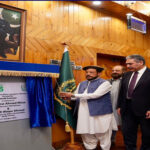Before the British came to the Indian subcontinent, there existed numerous independent states in areas which are now called Gilgit-Baltistan. There existed the independent states of Brooshaal, Dardistan, Bloristan, Hunza-Nagar, Yasen, Chilas, and Chitral. Among many other things what was common in all these states was that these territories never remained part of Kashmir.
Before about 1842, local chieftains were the rulers of these small but independent states who most of the time remained at loggerheads over petty issues and sometimes many of them also sought help from neighborly states. During one such skirmishes, the rulers of the Gilgit state sought help from the Dogra rulers of Kashmir who came to their help but had to face stiff resistance from the populace of the state. In 1857 things took a new turn with the independence movement in the Indian subcontinent which was dubbed as a mutiny by the British government. The British crushed the movement with full force in order to sustain its rule in the region and in a later stage with the plan of curtailing the spread of Russia the British decided to strengthen its presence in the areas from Gilgit to Chitral. In a bloody attack the British laid its feet on Hunza-Nagar in 1991-92, Chilas in 1892 and Chitral came under its occupation in 1895. In order to safeguard their rules and interests, the local rulers including the Rajas and Mehtars sided with the British and started a new wave of oppression and supression on their subjects. The foundation of the British rule in the barea started with the establishment of the Gilgit Agency in 1877 and the appointment of a political agent there whose job was to keep an eye on the local rulers and safeguard the interests of the British rulers. To further its footholds in the area, the British also set up the Gilgit Scouts. The local administration was also handed over to the army of the Maharaja of Kashmir by the British rulers. The Maharaja of the day, who had taken the oath of loyalty to the British, appointed his governor in Gilgit which ruled the area till 1947. Emboldened by the British back-up the Maharaja’s governor and the local rulers perpetrated injustices and repression on the local people without anyone asking them for their injustices. The rulers kept the populace deprived of their basic human rights and even considered provision of education to the masses as a crime. This is why even today most of the people in these areas remain illiterate. In 1935, the then British rulers took Gilgit-Baltistan on lease from the Maharaja at about 75,000 rupees under which the Union Jack used to be hoisted in the region till 1947.
After the second World War, the British rule started declining all over the world because of a number of reasons. But before leaving the Indian subcontinent the British very cleverly devised a plan and under the June 3, 1947, announcement gave the small states number over 600 the option to join any one of the emerging two states of India and Pakistan or maintain their current autonomous status. Taking advantage of the situation, the people of the Yasen state raised the flag of revolt against the Dogra rule and very soon the masses of the whole Gilgit-Baltistan joined hands against the rulers and forced them to flee from the rgeion. As a result, the people of Gilgit-Baltistan got freedom on Nov 1, 1947 after kicking out the Dogra rulers from the region. It is however was another tragedy that the freedom the people of the region won was short-lived and lost within a short period of two weeks.
The Pakistani administration coming under the head of a low level naib tehsildar was supposed to run the affairs of the new state and put things in order and go back but the rulers sitting at that time in Karachi had some other nefarious plans of occupying the area for ever. When tribesmen from Pakistani areas invaded Kashmir, a war broke out between the two countries resulting in India taking the matter of Kashmir to the United Nations on the basis of the Kashmiri rulers’ decision to join India in complete disregard to the wishes of the Muslim majority people of the state. As a result, India took the issue to the UN which through its two resolutions gave the right of self-determination to the people of Kashmir and Gilgit-Baltistan to decide about their future.
With the appointment of the UNCIP, the two countries were supposed to withdraw their civilian and military forces from all parts of Kashmir and GB to pave the way for the holding of a plebiscite in the areas. But this condition was dragged on as none of the countries pulled out of the area. Pakistan was never ever given the right by any authority under any international law to continue its occupation as it was mandated only to run the interim administration in the area till a plebiscite in which the people of the region were to decide about their future.However, with the passage of time instead of withdrawing from the disputed area Islamabad continued its occupation of the area and also suppressed the voice of the indigenous people. Not only that, Islamabad also cheated the people by stealing the land of the area and gifting some of the land to China in 1963. In 1999, the Supreme Court of Pakistan ruled that the government should ensure all human rights to the people of Gilgit-Baltistan.
In 2009, the federal government issued a governance order under which the current political system was introduced in Gilgit-Baltistan with the nomination of the chief minister and the governor. Under the autonomy rule, the erstwhile council was renamed as the legislative assembly. But the assembly has no power to pass any law or legislation and during the last five years it could not pass any law but its members have been enjoying all the perks and facilities at the expense of the poor people. Besides, though there are a governor and chief minister they are only on name as still all the decisions are taken and the administration by the bureaucracy and the governor and the chief minister are a puppet.
Today the people of Gilgit-Baltistan have become more conscious of their rights and the youths are also aware of their culture, identity and history and the need is to expedite the struggle for getting all the rights the people of the region have been denied for over six decades.























